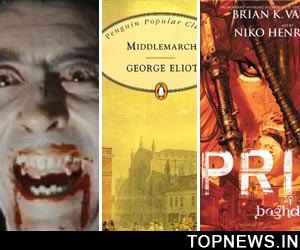Classic novels have instilled cooperative values in today''''s generation, say psychologistsy''''s generation, say psychologists
 London, Jan 15 : Classic Victorian novels like Dracula, Middlemarch and Pride and Prejudice sowed the seeds of values of cooperation and the suppression of hunger for power in today''''s generation, according to evolutionary psychologists.
London, Jan 15 : Classic Victorian novels like Dracula, Middlemarch and Pride and Prejudice sowed the seeds of values of cooperation and the suppression of hunger for power in today''''s generation, according to evolutionary psychologists.
For example in George Eliot''''s Middlemarch, Dorothea Brooke turns her back on wealth to help the poor, while Bram Stoker''''s nocturnal menace, Count Dracula, comes to represent the worst excesses of aristocratic dominance.
Psychologists said that the characters in the classic British novels from the 19th century helped us in upholding social order, and encouraged altruistic genes to spread through Victorian society.
Applying Darwin''''s theory of evolution to literature, evolutionary psychologists led by Joseph Carroll at the University of Missouri in St Louis, asked 500 academics to fill in questionnaires on characters from 201 classic Victorian novels.
All the respondents had to define characters as protagonists or antagonists, rate their personality traits, and comment on their emotional response to the characters.
It was found that the participants had put leading characters into groups that mirrored the cooperative nature of a hunter-gatherer society, where individual urges for power and wealth were suppressed for the good of the community.
The researchers claimed that the effect of such moralistic literature was to uphold and instil a sense of fairness and altruism in society at large.
"By enforcing these norms, humans succeed in controlling ''''free riders'''' or ''''cheaters'''' and they thus make it possible for genuinely altruistic genes to survive within a social group," the Guardian quoted the authors as saying.
Jonathan Gottschall, a co-author at Washington and Jefferson College in Pennsylvania, told New Scientist magazine that dominant behaviour was denounced in Victorian novels.
"Bad guys and girls are just dominance machines, they are obsessed with getting ahead, they rarely have pro-social behaviours," he said.
However, it was found that a more cooperative group was more likely to survive and spread its values.
In fact, there were a few characters, which were judged to have both good and bad traits, such as Heathcliff in Emily Bronte''''s Wuthering Heights and Jane Austen''''s Mr Darcy.
Carroll said that the conflicts shown by these characters reflect the strains of maintaining such a cooperative social order.
Stoker''''s Dracula and many of George Eliot''''s characters were more black and white.
The study has been published in the journal Evolutionary Psychology. (ANI)